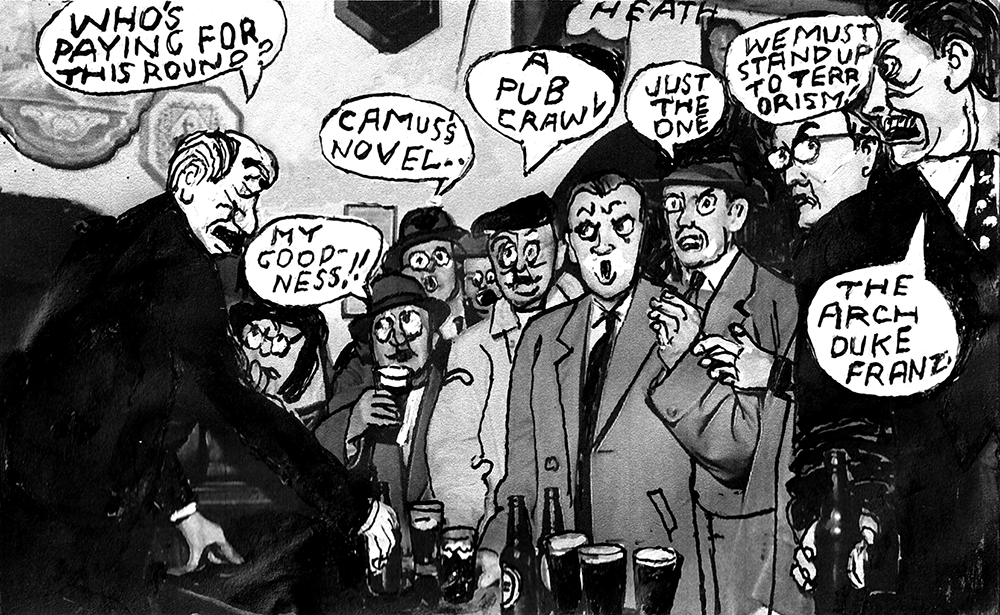Since the death of Alexei Navalny in an Arctic penal colony in February, Russia’s opposition movement has found itself in disarray. Instead of Navalny’s death uniting those exiled Kremlin critics campaigning for a democratic future for Russia, the past eight months have seen the opposition movement fracture into bickering factions, unable to collaborate on anything much at all. Now, that fighting has broken out into the open – and risks putting the cause of a future democratic Russia in jeopardy.
Last week, Latvia’s anti-corruption bureau announced they had begun an investigation into allegations made by Navalny’s Anti-Corruption Foundation (FBK) that Latvian law enforcement officers had had a hand in organising a physical attack on one of his allies earlier this year. Navalny’s former chief of staff Leonid Volkov was attacked with a hammer and tear gas outside his home in Vilnius, Lithuania in March, leaving him bleeding and bruised with a broken arm.
Navalny’s death in February has left a power vacuum in Russia’s democratic opposition
At the time, it was widely assumed that the attack on Volkov was a Kremlin hit-job: it took place approximately a month after Navalny himself died in highly suspicious circumstances. Even the Lithuanian intelligence services linked it back to Russia. The FBK, however, began its own investigation into who ordered the attack and finally revealed their findings last month. The culprit, they claimed, was not one of Russian president Vladimir Putin’s cronies but another Russian opposition figure, Leonid Nevzlin.
Nevzlin is a Russian-Israeli businessman who, alongside the Kremlin critic Mikhail Khodorkovsky, owned the oil company Yukos until the Russian state confiscated it in 2003. Following Putin’s invasion of Ukraine in 2022, Nevzlin renounced his Russian citizenship, stating he considered ‘the majority of the population of this nation to be Russian slave cattle’.
According to the FBK, Nevzlin ordered the attack on Volkov, promising hitmen $250,000 (£190,000) which he allegedly then failed to pay. There have been suggestions that the plot to attack Volkov may even have involved abducting and shipping him back to Russia. It was alleged that Latvian law enforcement officers were involved in helping Nevzlin in some capacity with the hit. Nevzlin has strongly denied any involvement in the attack, while Khodorkovsky has also dismissed the claims, suggesting that the evidence gathered by the FBK might have been fed to them as a result of an ‘FSB provocation’ by the Russian intelligence services.
The launch of the investigation into Latvia’s law enforcement coincided with the publication of more detail about the circumstances in which Navalny is reported to have died. On 29 September, the investigative outlet Insider published what it says are the undoctored versions of the report put together by the Russian authorities in the wake of Navalny’s death. The documents reveal that Navalny apparently ‘lay down on the floor, after which he began to complain of a sharp pain in the abdomen’. He reportedly began vomiting, then fitting and finally lost consciousness. None of these details have so far been verified, but they were certainly not mentioned in the report released to Navalny’s family.
On Friday, Khodorkovsky’s Dossier Centre investigative outfit published a leaked 75-item list of all the objects reportedly removed for examination from the prison colony where Navalny died. As well as personal belongings such as clothes and books, samples of Navalny’s vomit, swabs from his mouth, ears and nose were taken, as well as the snow lying in the exercise yard where he first fell ill. It is unclear what has since happened to all the objects confiscated; if the list is indeed authentic, it suggests a desire by the Russian authorities to leave no trace of what exactly happened to the late opposition leader.
In light of the revelations these documents claim to hold about Navalny’s fate, it is a poignant reminder that his death in February has left a power vacuum in Russia’s democratic opposition. These are groups who, in theory, have a common aim: unseating Putin, ending the war in Ukraine and bringing democracy to Russia. But the back and forth sparring between the different factions demonstrates the degree to which trust has broken down between them. Just yesterday, the FBK’s main public backer Boris Zimin published a scathing post on social media in which he accused the organisation of squandering Navalny’s legacy and focussing on infighting – claims the FBK hasn’t responded to.
Each camp, persecuted and chased out of Russia for criticising the Russian president at varying points over the past twenty years, can’t as yet agree how to achieve their political goals – or who, when the time comes, should take charge and lead the way. For the sake of the country’s post-Putin future, Russia’s democratic opposition must find a way to put their rivalries and infighting to bed – for good.








Comments